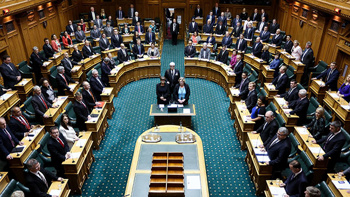
A New Zealand high school teacher has had his teaching registration cancelled after he refused to use the preferred pronouns and name for one of his transgender students.
It has led to the Teaching Council of Aotearoa New Zealand saying all students are “entitled to feel that schools are a safe space, where they are respected and valued” and teachers must not use their authority to “undermine the personal identity of their learners, or to inappropriately influence them”.
And one of New Zealand’s leading LGBT+ charities has also spoken out about the issue, saying it is important students’ identities are respected at school.
The teacher was placed before the Disciplinary Tribunal, an independent body with each panel chaired by a lawyer alongside two experienced teachers, in February after a complaint from the student.
The decision, released publicly today, said a 14-year-old student in the teacher’s math class was in the process of transitioning from girl to boy, and a “preferred male name” was recorded in the school’s online portal.
However, the maths teacher, whose name was withheld from the tribunal’s decision, refused to call the student by his preferred name and pronouns. He later met with the student during a morning tea break and told him gender transition went against his Christian beliefs.
The student came up with a compromise, telling the teacher he could refer to him by his preferred name, but continue to use she/her pronouns.
The teacher again refused, adding words to the effect of not wanting the student to “go down a path of sin”.
The tribunal heard that because of the man’s Christian beliefs, he refused to accept the concept of gender transitioning as a whole and refused to call them by their preferred name or pronouns.
But the teacher vehemently denied any misconduct when he represented himself during the hearing, explaining he felt would be guilty of serious misconduct and child abuse if he was to refer to the student by their chosen pronouns.
During his testimony, the teacher also continued to misgender the student and claimed he didn’t have to use their preferred name because the student was under the age of 18. The tribunal, however, retorted by suggesting the teacher would have no problem referring to a “Matthew” as “Matt” if they so wished.
Following this, the teacher argued that making him use differing pronouns for a student - rather than those assigned at birth - went against his “core Christian belief” which he said was “foundational for New Zealand”.
The teacher also said anyone attempting to move away from their gender at birth needs “help and deliverance” and it was wrong for schools to suggest or teach children that gender is a choice.
The teacher’s submissions also comprised what he believed was the “obvious next sin” after transitioning, which he claimed was homosexuality.
He also presented to the tribunal multiple examples of scripture from the Bible that read “man should only lie with a woman” and homosexuality steps away from “God’s plan”.
Abortion was also mentioned during his submission to the tribunal, and he argued all forms of abortion strayed away from Christian values and should be considered murder.
Further submissions saw the teacher compare pronouns to a hypothetical case where a student wanted to identify as “earthly royalty or a judge” and wanted to be referred to using the pronoun “Your Honour”.
“Although these examples may seem absurd, they are the same logic as calling a girl a boy, or a boy a girl and may lead to abuse of teachers and others. Is it appropriate for a teacher to call a student by the pronoun ‘Your Honour’ or to expect teachers to refer to students as different animals?” the teacher suggested.
His submission was rounded out by the claim he believed there were no grounds for a misconduct charge, and that he was acting in the best interest of the student.
The tribunal disagreed and said there was “no hesitation” that the teacher acted with serious misconduct.
“For a trusted adult teacher to not only ignore the student’s wishes and the instruction of the school but also to isolate them and advise them it was wrong, risked quite significant harm,” deputy chair Tim MacKenzie wrote in his decision.
The tribunal found the student had handled the teacher’s conduct bravely, but added a student should never have to try and negotiate a compromise for a matter such as this.
It noted it was “not moving to punish” the teacher for his response and position.
“He is entitled to his views and religious beliefs. What we must do is consider whether he has insight and rehabilitative prospects that we could address.”
However, the tribunal said the only answer to that was “no”.
“In our view there is a real and appreciable risk that such conduct, or similar conduct, will be repeated by [the teacher] if he was to be in that position again. Indeed, given [the teacher’s] statements to us, we would say that it is quite likely to occur again in similar circumstances.”
The tribunal also found the teacher’s submissions comprised “unrealistic hysteria”.
“The arguments referencing the risk of homosexuality and abortion may well be welcome and normal within the context of [the teacher’s] private life and views. However, they are disgraceful when used in the present context.”
The tribunal found the cancellation of the teacher’s licence was the only appropriate way forward and ordered him to pay costs.
The teacher also resigned from his role at the school, the decision said.
Students ‘entitled to feel that schools are a safe space’
In a statement today, the Teaching Council of Aotearoa New Zealand said all students were “entitled to feel that schools are a safe space, where they are respected and valued”.
“All teachers are legally bound and regularly recommit to comply with the code which sets out the commitments to the teaching profession, learners, families and whānau and society. In essence it describes how a teacher must behave. When the code is broken, it can result in disciplinary action being taken.”
Although the Teaching Council said it was unable to comment on individual cases to ensure confidentiality and natural justice, it said in its statement that it was an important public interest issue and wanted to clarify the expectations it has for teachers.
“Teachers need to help learners to think critically about issues and understand different views, theories, perspectives and experiences and it is not okay for a teacher to use their authority to undermine the personal identity of their learners, or to inappropriately influence them to take a course of action.
“It is the Teaching Council’s position that in this case the teacher should have applied the code and the values of the teaching profession, when asked by a student to use their preferred pronouns.”
LBGT+ charity on importance of correct pronouns for youth
The managing director of one of New Zealand’s LGBT+ charities, InsideOut, has stressed how it believes it is important young people’s correct pronouns are used.
InsideOut managing director Tabby Besley told the Herald it shouldn’t be “such a big deal” when students wish to be called for a name that more correctly matches their preferred gender.
“I mean, students use nicknames or different names all the time and we’re able to adapt to that, when people get married, they change their name, we adjust to that, it’s really not such a big deal,” Besley said.
“It’s really about the difference that can make, for a young person to have their name and pronouns respected at school, it helps it to be a safe place for them.
“For some young people, that may be the only safe environment they’re part of.”
Besley said there are several academic studies that show suicide and depression rates in transgender youth are significantly decreased when correct pronouns are used.
“Unfortunately, it is something that we hear commonly from young people, that teachers and other students are choosing not to respect their names and pronouns at school or putting extra difficulties in place around it,” Besley said.
She said not all teachers were like the maths teacher in the tribunal’s decision, and there were some positive changes happening in some classrooms around New Zealand.
Rachel Maher is an Auckland-based reporter who covers breaking news. She has worked for the Herald since 2022.
Take your Radio, Podcasts and Music with you









